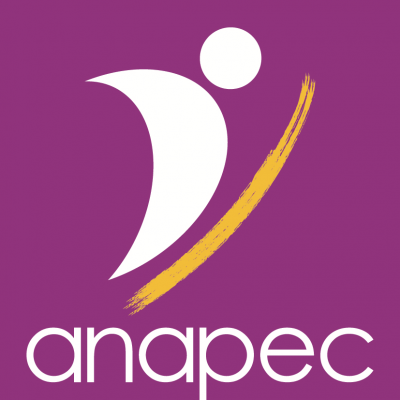The National Agency for the Promotion of Employment and Competencies (ANAPEC) is a public establishment with legal personality and financial autonomy, created in 2000 by Law 51-99, and started its activity in September 2001. The agency’s mission is to contribute to the organization and implementation of programmes for the promotion of skilled employment decided by the public authorities.
To this end, it is responsible for
- Prospecting, collecting job offers from employers and matching job supply and demand;
- Providing reception, information and guidance to jobseekers;
- To inform and guide young entrepreneurs in the realization of their economic projects;
- Assist and advise employers in defining their skills needs;
- To set up vocational adaptation and training programmes for integration into working life in liaison with employers and training establishments;
- Conclude agreements with professional associations for the development of self-employment and the encouragement of young initiative;
- To carry out any mission in relation to its attributions which may be entrusted to it by the State, local authorities or public establishments within the framework of agreements;
- To provide the supervisory authority, on a periodic basis, with information on the functioning of the labour and skills market;
- To draw up and update the descriptive directories of jobs and professions;
- Examining job offers from abroad and prospecting all opportunities for the placement abroad of nationals who are candidates for emigration.
ANAPEC accompanies:
- Job Seekers
- Employers
- Project sponsors
- Candidates for emigration
ANAPEC’s flagship programs are:
- Idmaj: aimed at redundant workers, it aims at the integration of young university graduates through a professional integration contract offering fiscal and parafiscal advantages to the employer. An evaluation of this programme has shown that the retention rate for trainee-employees is only 44%.
- Taehil: This programme provides contract-based training for employment (for a defined position) and retraining for graduates whose specialities suffer from a lack of job opportunities on the labour market.
- Moukawalati: Launched in September 2006, Moukawalati is a very ambitious programme at the outset and is intended to finance and support young entrepreneurs. Once selected, the project leader is supported by a support structure (Moukawalati counter).
- Tahfiz programme, brought in during 2015, aims to promote employment by addressing newly-created enterprises. Any enterprises recruiting new employees on indeterminate contracts using the ‘adaptation-insertion’ mechanism will receive State support in the form of payment of medical insurance and exception from the VET tax.
ANAPEC has 75 branches and employs 610 executives.




